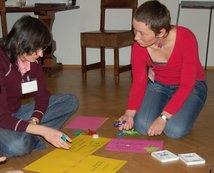Cross-border cooperation professions
Overview
Professionalisation in the cross-border field
The ‘pioneers’ of cross-border professions acquired their skills and knowledge on the job, gradually improvising solutions as and when problems arose, in order to overcome the new institutional, legal and cultural obstacles they were facing.
Subsequently, training courses for cross-border professions began to appear, around a new framework identifying the specificities of these professions (programme manager, project engineering consultant, project leader...).
This new generation has taken on a dual challenge: recognition/legitmacy and professionalisation. The recognition of cross-border professions at the national level is a pre-requisite for their development. The challenge is to move beyond training based on transmission of information and sharing of good practices to training that is also founded on theoretical knowledge and concepts.
In order to achieve this, capitalisation of the amassed information, doctrines and knowledge must be carried out in order to be able to then organise its transmission to various target audiences, through training courses and degree modules, publications, seminars and networking.
The transmission of this knowledge cannot therefore be separated from its production – in other words from research work. It has to be supported by the development of training tools adapted to this type of European territorial cooperation.


